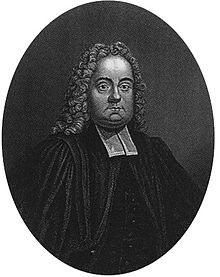Matthew Henry

Matthew Henry (18 October 1662 – 22 June 1714) was an English commentator on the Bible and Presbyterian minister.
Life
He was born at Broad Oak,a farmhouse on the borders of Flintshire and Shropshire. His father, Philip Henry, had just been ejected under the Act of Uniformity 1662. Unlike most of his fellow-sufferers, Philip possessed some private means, and was thus able to give his son a good education. Matthew went first to a school at Islington, and then to Gray's Inn. He soon gave up his legal studies for theology, and in 1687 became minister of a Presbyterian congregation at Chester. He moved again in 1712 to Mare Street, Hackney. Two years later (22 June 1714), he died suddenly of apoplexy at the Queen's Aid House (41 High Street) in Nantwich while on a journey from Chester to London. [1][2]
Works
Matthew Henry's well-known six-volume Exposition of the Old and New Testaments (1708–1710) or Complete Commentary, originally published in 1706, provides an exhaustive verse by verse study of the Bible.[3] covering the whole of the Old Testament, and the Gospels and Acts in the New Testament. After the author's death, the work was finished (Romans through Revelation) by thirteen other nonconformist ministers, partly based upon notes taken by Henry's hearers, and edited by George Burder and John Hughes in 1811.[4]
Henry's commentaries are primarily exegetical, dealing with the scripture text as presented, with his prime intention being explanation, for practical and devotional purposes. While not being a work of textual research, for which Henry recommended Matthew Poole's Synopsis, Henry's Exposition is seen to quietly give the result of an accurate critical knowledge of the original fully up to the best critics of his time, and excels at practical application, [5][6], displaying good sense, discrimination, high moral tone and simple piety, combined with the well-sustained flow of its English style, and was long celebrated as the best of English commentaries for devotional purposes, while still seeing wide use today.
Famous evangelical Protestant preachers such as George Whitefield and Charles Spurgeon used and heartily commended the work, with Whitefield reading it through four times - the last time on his knees.[7] Spurgeon stated, " Every minister ought to read it entirely and carefully through once at least." [8]
Henry's Miscellaneous Writings, including a Life of Mr. Philip Henry, The Communicant's Companion, Directions for Daily Communion with God, A Method for Prayer, A Scriptural Catechism, and numerous sermons, the life of his father, tracts, and biography of eminent Christians, together with the sermon on the author's death by the Reverend William Tong were edited in 1809 and in 1830 a new edition included sermons not previously included and Philip Henry's "What Christ is made to believers". The collection was issued several times by different publishers.[9]
References
- ^ Religious Tract Society, Christian Biography: Lives of William Cowper, Mrs. Ann H. Judson, Anna Jane Linnard, Matthew Henry, 1799, Matthew Henry
- ^ Images of England: 41 High Street, Nantwich
- ^ "Matthew Henry Commentary on the Whole Bible, 6 volumes". Retrieved 2007-10-11.
- ^ Matthew Henry: Minister and Bible Commentator
- ^ Henry, Matthew. "General Information." Blue Letter Bible. 1 Mar 1996. 2010. 19 Sep 2010
- ^ http://www.wholesomewords.org/biography/bhenry2.html
- ^ The New Schaff-Herzog Encyclopedia of Religious Knowledge, Philip Schaff Vol. V:, Matthew Henry
- ^ Commenting and Commentaries, p. 3
- ^ "Matthew Henry's Miscellaneous Writings". Copac. Retrieved 05 December 2009.
{{cite web}}: Check date values in:|accessdate=(help)
This article incorporates text from a publication now in the public domain: Chisholm, Hugh, ed. (1911). Encyclopædia Britannica (11th ed.). Cambridge University Press. {{cite encyclopedia}}: Missing or empty |title= (help)
